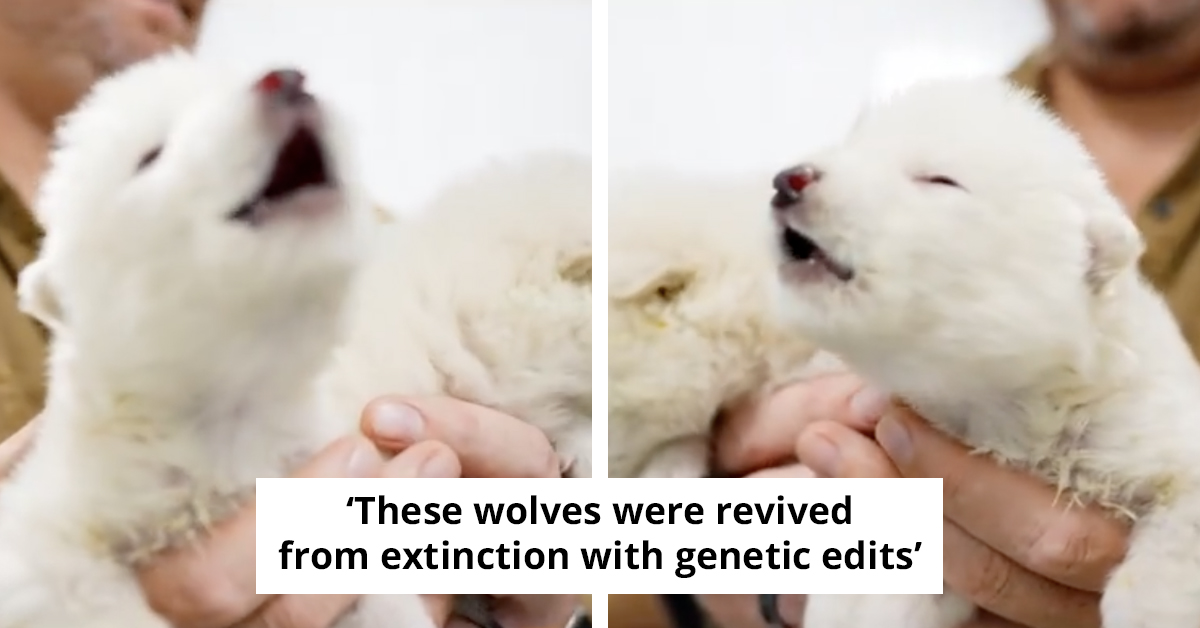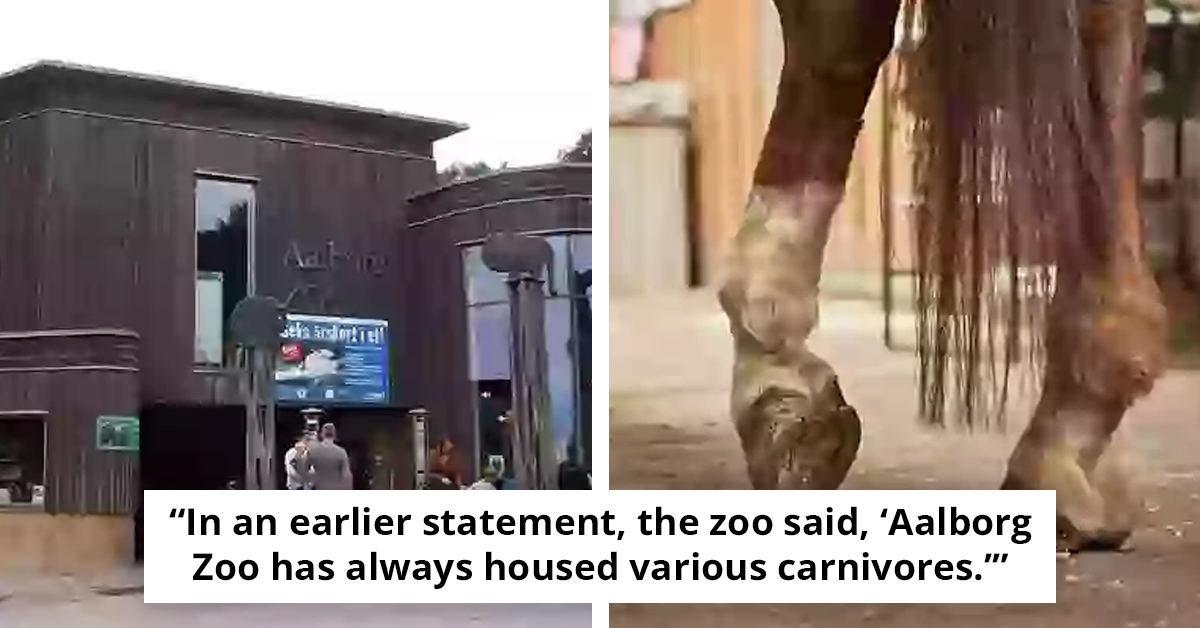Bride Gets Heat From Her Family After Choosing Her Cat And Dog To Be The Ring Bearer & Flower Girl At Her Wedding Instead Of Her Brother's "Miracle Rainbow Babies"
In recent years, the term rainbow baby refers to a child born to parents who have previously lost a child or a pregnancy. Rainbow babies symbolize hope after a trying time in the parents' lives.
A Redditor's brother and sister-in-law have rainbow babies who are twins. Their family showers the twins, Liam and Ava, with much love and affection because of their "special" status at the expense of the other grandbabies in the family.
OP doesn't participate in this special treatment owing to the fact she and her fiancé live across the country. The details of their wedding must be finalized as the date draws near.
They decided to assign their dog Mika and cat Tibby to be the flower girl & ring bearer for the occasion. OP's fiancé enthusiastically agreed to the idea.
Their pets are like their children. They helped OP come out of her depression and kept her fiancé company while he was undergoing chemotherapy, and OP worked long hours to pay their bills.
They love Mika and Tibby to bits & they complete their small family. OP didn't think this choice would be a problem when she brought it up during a family get-together.
Her sister-in-law asked her later why she gave Liam's and Ava's roles to the animals. OP was confused by her sister-in-law's question and asked her to explain.
She said that Liam and Ava are miracle rainbow babies, they obviously should be the flower girl and ring bearer

She said it will be good for the family if the twins are in the wedding. It is also against tradition to have animals in a wedding.
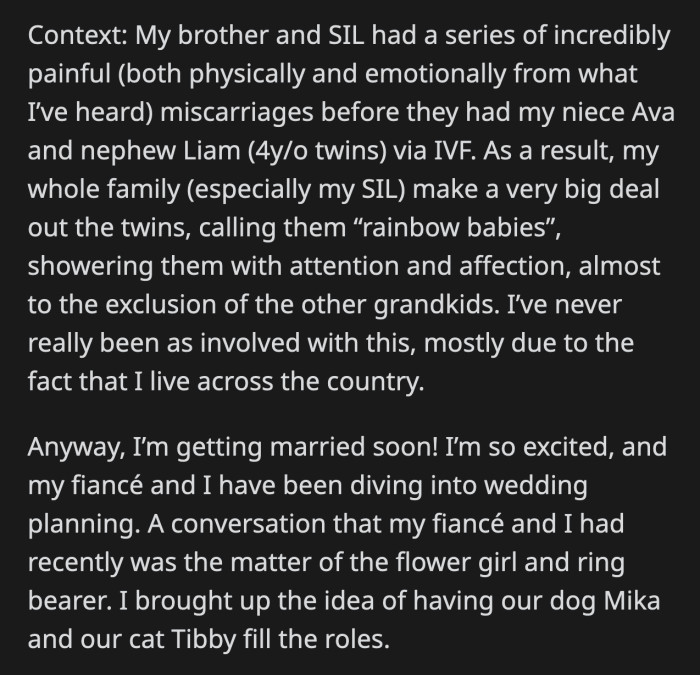
She then showed OP a photo of Ava in a flower girl dress for OP to see how cute Ava would be
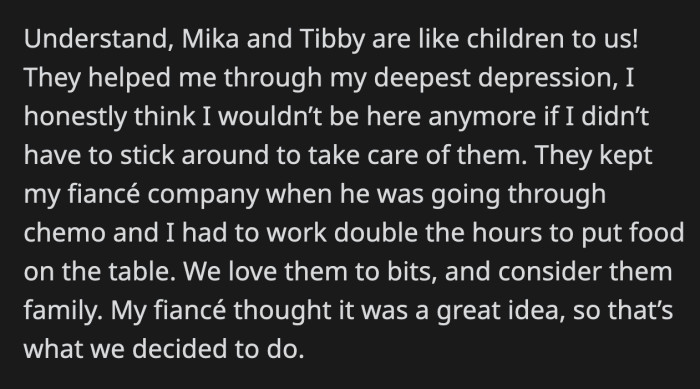
Tradition vs. Personal Preference
The clash between tradition and personal preference is a common theme in family dynamics. Dr. Hannah Roberts, a cultural psychologist at the University of Toronto, discusses how personal choices can challenge existing family traditions.
In this case, the bride’s decision to include her pets instead of her brother’s children reflects a prioritization of personal values over traditional expectations. Research indicates that honoring personal preferences can lead to greater satisfaction in significant life events.
Tradition vs. Personal Preference in Weddings
The tension between tradition and personal preference often arises in wedding planning. Research from McGill University indicates that individuals frequently grapple with societal expectations versus their desires when planning significant events.
In this case, the bride's choice to include her pets instead of children reflects her prioritization of personal values over traditional expectations.
Challenging Traditional Norms in Family Dynamics
Dr. Hannah Lee, a cultural psychologist at McGill University, emphasizes that weddings often serve as a battleground for traditional versus modern values. In this case, the bride's choice reflects a desire to challenge societal norms surrounding family roles and responsibilities.
Research indicates that individuals who embrace non-traditional roles may face pushback from family members who cling to conventional expectations, leading to tensions during significant life events.
OP told her sister-in-law that she will not make a decision without her fiancé's input. Her fiancé said it would be okay but he prefers to have their pets fill the roles.
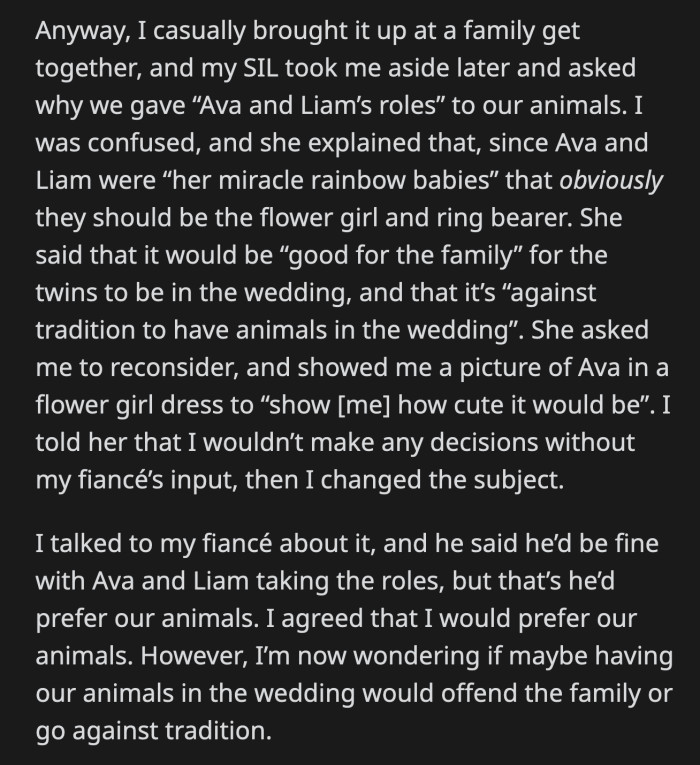
OP feels that they're not doing anything wrong, but she wanted other people's opinions just to be sure

OP said Liam and Ava are too young to walk the pets down the aisle

This situation also highlights the concept of family loyalty, which can often lead to conflict. According to studies in the Journal of Family Studies, loyalty to family traditions can create pressure to conform, which may not resonate with individual desires.
The sister-in-law's objections may stem from her own attachment to traditional family values, further complicating the dynamics. Understanding these motivations can help facilitate healthier discussions about family choices.
Psychology indicates that weddings can be flashpoints for family conflict, particularly when expectations clash. According to studies in social psychology, feelings of ownership over wedding traditions can lead to heightened emotional responses.
The bride's decision may symbolize her desire for autonomy and a reflection of her individual identity.
According to studies published in the 'Journal of Cultural Psychology,' the clash between tradition and personal values can create significant emotional distress. When family members feel that their expectations are being undermined, it can lead to feelings of betrayal and resentment, complicating relationships.
This underscores the importance of open dialogue about values and expectations surrounding family events.
Is Tibby the cat leash-trained? If not, they will have a hard time at the ceremony if she's not comfortable with a leash.

Tibby is apparently leash-trained and has no issues being around a lot of people

A designated pet-sitter to mind them throughout the event could also be a good plan
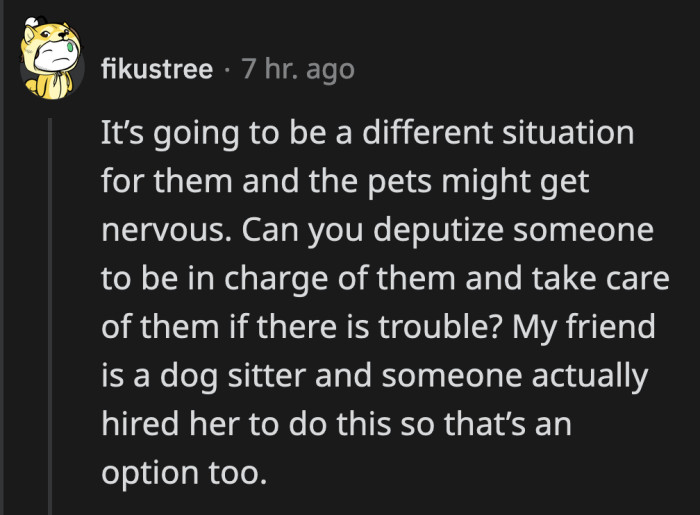
The Importance of Individual Expression
Encouraging individual expression within family contexts can lead to healthier relationships. Dr. Judith Jordan, a relational therapist, emphasizes the importance of validating individual choices as a means of fostering connection.
In this scenario, the bride’s choice reflects her desire for authenticity and personal expression. Research shows that when individuals feel free to express themselves, it can enhance overall family cohesion.
The Role of Pets in Family Dynamics
Pets often hold significant emotional value in many families, and their inclusion in ceremonies can be deeply meaningful. Dr. Julie Hecht, an animal behavior researcher, emphasizes that pets can serve as important emotional support systems, influencing family dynamics.
In this context, the bride's choice to have her pets participate may symbolize her commitment to her relationship with them and her identity as a pet owner.
Strategies for Navigating Family Tensions
To address these challenges, experts recommend engaging in conversations that allow all family members to express their feelings. Dr. Michelle Roberts, a family therapist, suggests creating a safe space where differing views can be discussed without fear of judgment.
By validating each other's perspectives, families can work toward understanding and compromise, reducing tensions during events like weddings.
OP says they already planned for that just in case, but the wedding will be held in their home so it is not a pressing issue

If OP gives in, she should be prepared to share the spotlight with the two kids
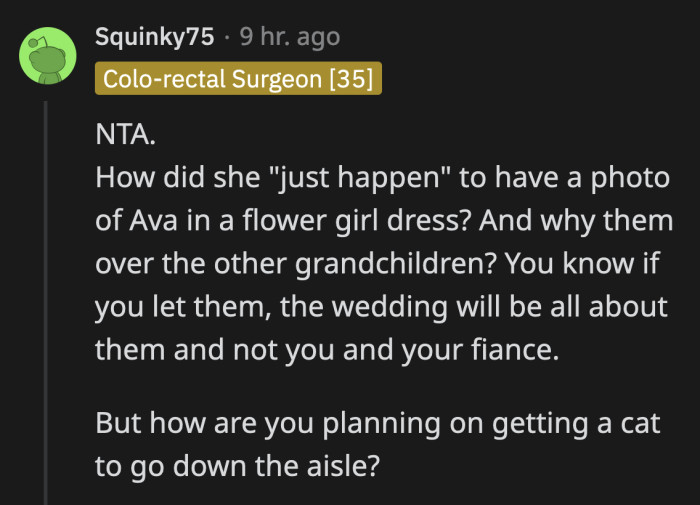
But it looks like the pets are already trained to walk down an aisle as long as their treat bag is visible

Expert Recommendations for Balancing Tradition and Individuality
To navigate the tension between tradition and individuality, families should encourage open discussions about values and preferences. Creating a space for all voices to be heard can help reconcile differing opinions and foster mutual respect.
Additionally, exploring ways to incorporate both traditional elements and personal preferences can create a more inclusive atmosphere that honors everyone's feelings.
To navigate conflicts over traditional expectations, couples should engage in discussions about their values and preferences. Establishing clear boundaries and ensuring open communication can help mitigate misunderstandings and foster acceptance of individual choices.
Encouraging family members to express their feelings while respecting the couple's decisions can also promote harmony.
Additionally, fostering empathy can be instrumental in bridging the gap between differing values. Recognizing that family members may have their own emotional investments in traditions can help facilitate more productive conversations and lead to healthier relationships.
This approach aligns with research suggesting that families who practice empathy report greater satisfaction and resilience in their relationships.
Their miracle babies are special to them as they should be, but OP doesn't owe her brother and sister-in-law the same reverence they give to their children
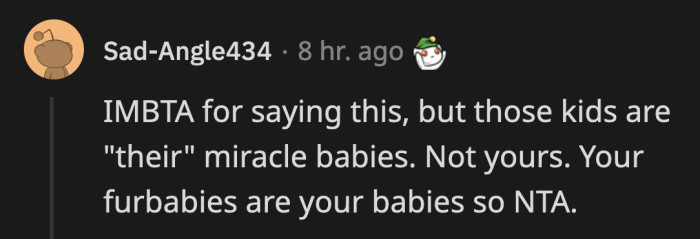
The focus on that day will be on the bride and groom anyway
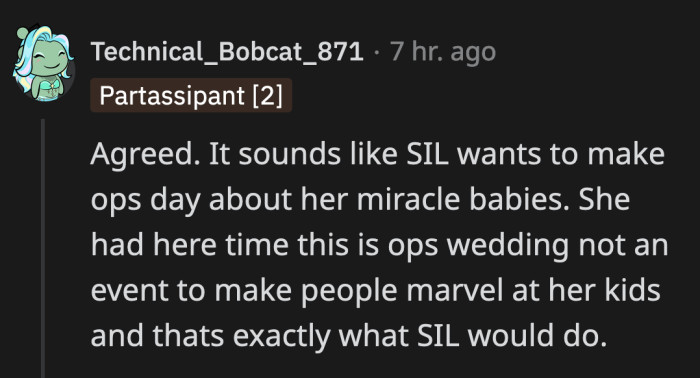
She sure had that photo ready. It probably means the twins have been in other weddings or they already shopped for their clothes.
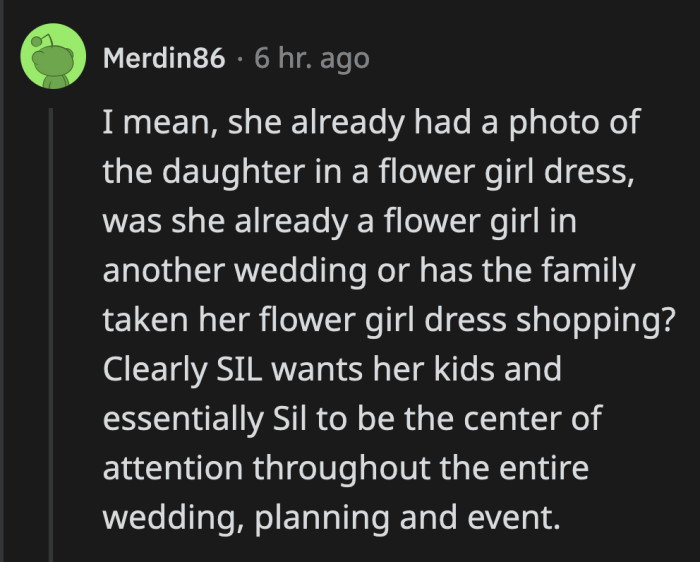
If it isn't OP's pets, why should the ring bearer and flower girl role automatically go to Liam and Ava? How about the other children in the family?

The choice is really up to OP and her fiancé at the end of the day

They only need to worry about themselves and the stress level of their pets on the day of the wedding

It's tacky to question OP why her beloved pets are a part of the wedding
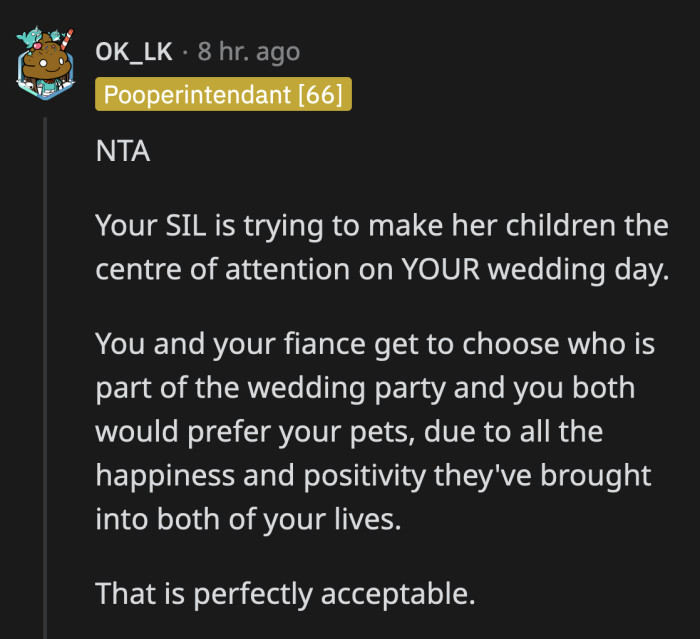
However, OP should prepare herself from the backlash from her family after her SIL informs them of her final choice
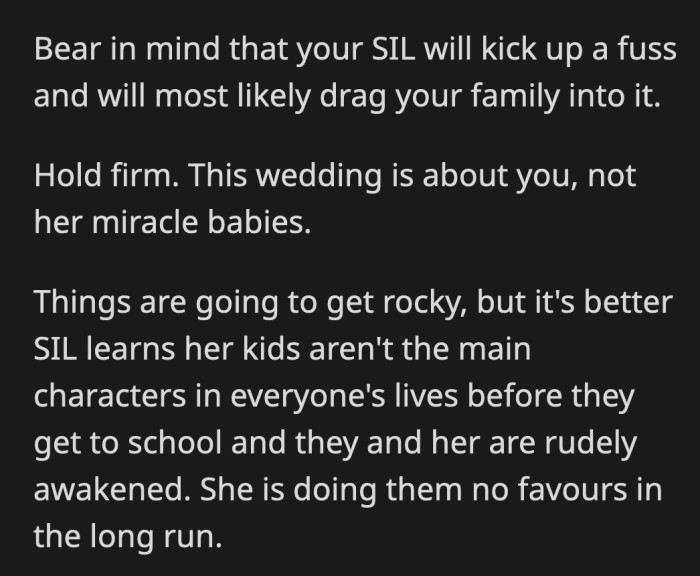
It would probably be too much to ask OP for photos of Tibby and Mika in their wedding attire, right? We can only imagine how adorable and dapper they would look on the day!
OP and her fiancé obviously want their pets to be a part of their special day. They shouldn't be coerced into including anybody they do not want just to appease entitled parents.
Expert Opinion
This situation illustrates the tensions that can arise when personal values clash with family traditions. It's important for family members to communicate openly and respectfully to navigate these differences and maintain healthy relationships.
Analysis & Alternative Approaches
In conclusion, navigating family dynamics during weddings requires sensitivity and understanding of differing values. By fostering open communication and empathy, families can maintain healthy relationships while respecting individual choices.
Ultimately, embracing dialogue can lead to more harmonious celebrations and stronger family ties.
Expert Opinion
This situation underscores the complexities of balancing personal preferences with familial expectations in wedding planning. The bride’s choices reflect her values and identity, which can sometimes clash with traditional norms. Open communication about these values is essential for reducing conflict.
Analysis & Alternative Approaches
In conclusion, the intersection of tradition and personal preference in weddings requires careful navigation of expectations. Understanding the emotional significance of these choices can foster healthier family dynamics. As Dr. Sue Johnson notes, 'Emotional safety is vital in maintaining healthy relationships.'
Expert Opinion
This situation highlights the common tension between tradition and personal choice in family dynamics. It's essential for families to engage in open dialogues to honor both individual preferences and familial expectations.
Encouraging individual expression can enhance family cohesion and reduce feelings of resentment.
Analysis & Alternative Approaches
Behavioral experts emphasize that the balance between tradition and individuality is vital for maintaining healthy family dynamics. By understanding and respecting individual choices, families can foster stronger connections and reduce conflict.
Ultimately, encouraging open communication and mutual respect can lead to more harmonious family relationships.
